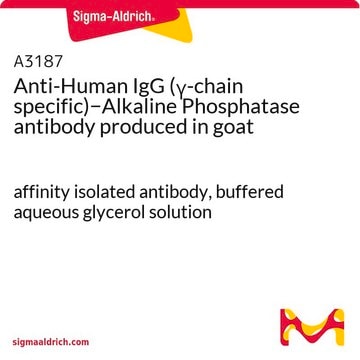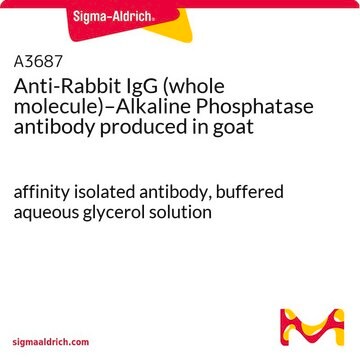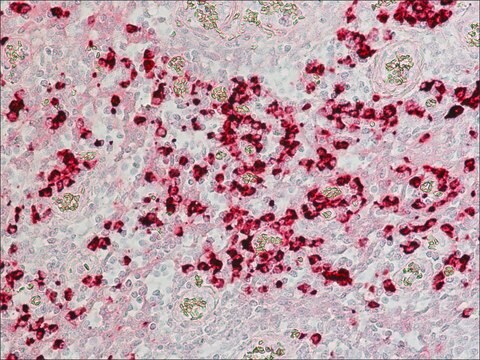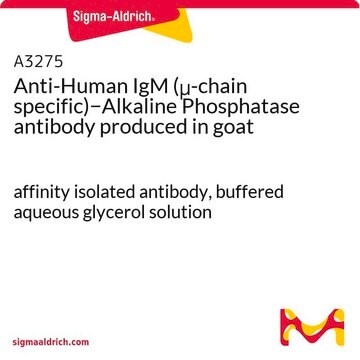A9544
Anti-Human IgG (Fc specific)−Alkaline Phosphatase antibody produced in goat
affinity isolated antibody, buffered aqueous solution
Synonyme(s) :
Anti Human Igg, Anti-Human IgG Antibody - Anti-Human IgG (Fc specific)-Alkaline Phosphatase antibody produced in goat, Anti-Human Igg, anti human IgG antibody
About This Item
Produits recommandés
Source biologique
goat
Niveau de qualité
Conjugué
alkaline phosphatase conjugate
Forme d'anticorps
affinity isolated antibody
Type de produit anticorps
secondary antibodies
Clone
polyclonal
Forme
buffered aqueous solution
Technique(s)
direct ELISA: 1:55,000
dot blot: 1:40,000 (chemiluminescent)
immunohistochemistry (formalin-fixed, paraffin-embedded sections): 1:150
Conditions d'expédition
wet ice
Température de stockage
2-8°C
Modification post-traductionnelle de la cible
unmodified
Description générale
Spécificité
Binds human IgG; does not bind other human Igs.
Provides reduced background with mouse or rat samples.
Immunogène
Application
Anti-Human IgG (Fc specific)-Alkaline Phosphatase antibody has been used in
- quantitative sandwich ELISA
- α-GalC ELISA
- ELISA assays
- ELISAs for IgG subclasses
Actions biochimiques/physiologiques
Forme physique
Stockage et stabilité
Autres remarques
Working dilutions should be determined by titration assay. Due to differences in assay systems, these titers may not reflect the user′s actual working dilution.
Clause de non-responsabilité
Vous ne trouvez pas le bon produit ?
Essayez notre Outil de sélection de produits.
Code de la classe de stockage
12 - Non Combustible Liquids
Classe de danger pour l'eau (WGK)
WGK 1
Point d'éclair (°F)
Not applicable
Point d'éclair (°C)
Not applicable
Certificats d'analyse (COA)
Recherchez un Certificats d'analyse (COA) en saisissant le numéro de lot du produit. Les numéros de lot figurent sur l'étiquette du produit après les mots "Lot" ou "Batch".
Déjà en possession de ce produit ?
Retrouvez la documentation relative aux produits que vous avez récemment achetés dans la Bibliothèque de documents.
Les clients ont également consulté
Notre équipe de scientifiques dispose d'une expérience dans tous les secteurs de la recherche, notamment en sciences de la vie, science des matériaux, synthèse chimique, chromatographie, analyse et dans de nombreux autres domaines..
Contacter notre Service technique














